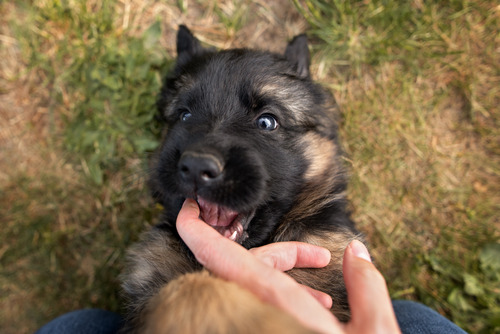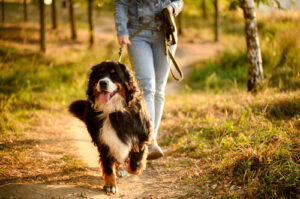Puppy biting is a common issue that many new pet owners face. While it can be a normal part of a puppy’s development, address this behavior early to prevent it from becoming a more serious problem. This blog will guide you through effective strategies to stop puppy biting and help your new furry friend grow into a well-behaved adult dog. For personalized advice or to schedule a consultation, call our Vaughn Road location at (334) 271-1003, call our Carter Hill location at (334) 269-2508, or request an appointment online.
Understanding Puppy Biting
Puppy biting is a natural behavior that stems from their instinct to explore the world with their mouths. Puppies bite during play, to alleviate teething pain, and to learn about their environment. While this behavior is normal, it is crucial to teach your puppy appropriate ways to interact with people and other animals.
Why Do Puppies Bite?
Puppies bite for several reasons. Understanding these reasons can help you address the behavior more effectively:
- Teething: Just like human babies, puppies go through a teething phase. Their gums are sore, and biting helps relieve discomfort.
- Exploration: Puppies use their mouths to explore their surroundings. Biting is a way for them to learn about objects and textures.
- Play: Puppies play by chasing, biting, and wrestling with their littermates. This play helps them develop social skills and coordination.
- Attention-Seeking: Sometimes, puppies bite to get attention from their owners. If they learn that biting results in a reaction, they may continue the behavior.
- Excitement or Overstimulation: Puppies often bite when they are overly excited or overstimulated. This can happen during play or when meeting new people.
Effective Strategies to Stop Puppy Biting
Addressing puppy biting requires consistency and patience. Here are several effective strategies to help curb this behavior:
Provide Appropriate Chew Toys
Offering a variety of chew toys can help satisfy your puppy’s need to bite and chew. Choose toys that are safe and durable, and rotate them regularly to keep your puppy interested.
Use Positive Reinforcement
Positive reinforcement is one of the most effective ways to train a puppy. Reward your puppy with treats, praise, or playtime when they exhibit appropriate behavior. This encourages them to repeat the behavior.
Teaching Bite Inhibition
Teaching your puppy bite inhibition involves helping your puppy understand that human skin is sensitive and that they should be gentle when using their mouths. When your puppy bites too hard, let out a yelp or say “ouch” loudly, and then ignore them for a few seconds. This mimics the reaction of their littermates and teaches them that biting too hard ends playtime.
Redirecting Biting Behavior
When your puppy starts to bite, redirect their attention to a chew toy or a game that doesn’t involve biting. This helps them learn that chewing on toys is acceptable, while biting humans is not.
Consistency is Key
Consistency is vital when training your puppy. Ensure that all family members and visitors follow the same rules and use the same commands. Inconsistency can confuse your puppy and make training more difficult.
Socialization and Training Classes
Socialization is an essential part of puppy development. Exposing your puppy to different people, animals, and environments helps them become well-adjusted adults. Consider enrolling your puppy in a training class to teach basic commands and proper behavior.
The Importance of Socialization
Socialization helps puppies learn how to interact appropriately with other dogs and people. It reduces the likelihood of fear-based aggression and biting. Puppies that are well-socialized are typically more confident and less likely to develop behavioral issues.
Benefits of Professional Training
Professional training classes provide structured learning environments and expert guidance. Trainers can offer valuable tips and techniques to address puppy biting and other common issues. Additionally, these classes provide opportunities for your puppy to socialize with other dogs in a controlled setting.
Recognizing When to Seek Professional Help
In some cases, puppy biting may persist despite your best efforts. If your puppy’s biting behavior is severe or you are struggling to manage it, seeking professional help is essential. If you notice persistent or aggressive biting, or if your puppy’s biting results in injuries to people or other animals, it’s time to seek professional help.
Finding the Right Professional
Look for certified trainers or veterinary behaviorists with experience in dealing with puppy biting. They can assess your puppy’s behavior and develop a customized training plan. For personalized advice or to schedule a consultation, call our Vaughn Road location at (334) 271-1003, call our Carter Hill location at (334) 269-2508, or request an appointment online.
Building a Strong Bond with Your Puppy
Building a strong bond with your puppy is crucial for their overall development and well-being. Spend quality time with your puppy through play, training, and socialization. A strong bond fosters trust and makes training more effective.
Engaging in Interactive Play
Interactive play, such as fetch or tug-of-war with a toy, helps burn off your puppy’s energy and provides mental stimulation. Ensure that playtime is fun and engaging for both you and your puppy.
Consistent Training and Positive Interaction
Regular training sessions reinforce good behavior and strengthen the bond between you and your puppy. Use positive reinforcement to reward desirable behaviors and create a positive association with training.
Creating a Safe and Stimulating Environment
A safe and stimulating environment is essential for preventing undesirable behaviors like biting. Provide your puppy with plenty of opportunities for physical and mental exercise.
Physical Exercise
Regular exercise helps burn off excess energy and reduces the likelihood of biting out of boredom or frustration. Take your puppy for walks, play in the yard, or visit a dog park to ensure they get enough physical activity.
Mental Stimulation
Mental stimulation is equally important as physical exercise. Provide puzzle toys, engage in training sessions, and offer new experiences to keep your puppy mentally stimulated and satisfied.
Supporting Your Puppy’s Development
Supporting your puppy’s development stages can help address biting and other behavioral issues. Puppies go through various developmental stages, each with its own challenges and opportunities for learning.
The Teething Phase
The teething phase can be particularly challenging due to increased biting behavior. Provide appropriate chew toys and be patient as your puppy goes through this phase.
Adolescent Stage
During the adolescent stage, puppies may test boundaries and exhibit challenging behaviors. Consistent training and reinforcement are essential during this time to ensure they continue to develop good habits.
Guiding Your Puppy Towards Better Behavior
Addressing puppy biting effectively requires patience, consistency, and understanding of your puppy’s development. By providing appropriate chew toys, using positive reinforcement, and seeking professional help when needed, you can guide your puppy towards becoming a well-mannered adult dog. For personalized advice or to schedule a consultation, call our Vaughn Road location at (334) 271-1003, call our Carter Hill location at (334) 269-2508, or request an appointment online.






